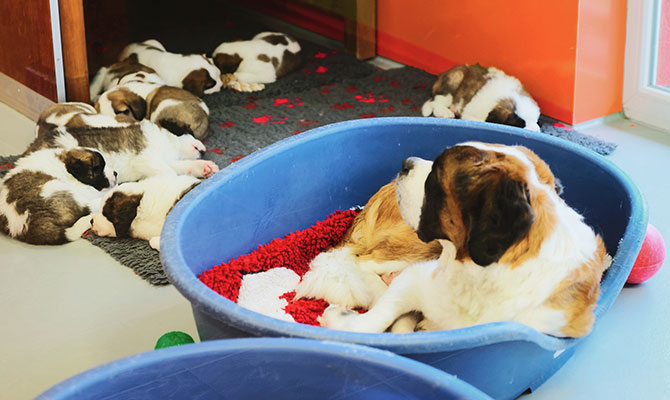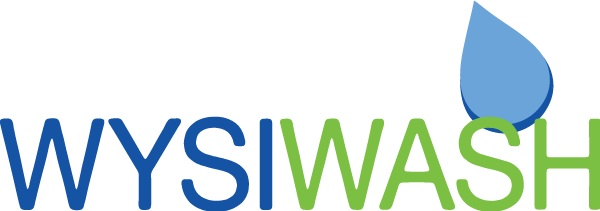How Often Should I Clean My Kennels?

We get a lot of questions from new breeders on how to properly clean their kennel areas. Cleaning kennels is not fun but it's a vital part of caring for animals.
Whether you are breeding dogs professionally or occasionally, providing a clean place for your dog is a must.
Cleaning means more than just taking care of regular dirt, it means regularly and thoroughly disinfecting the area. However, the question remains, how often? It mainly depends on how many dogs are around, how adventurous and messy they can get, and the materials used in your dog areas.
I recommend breeders to go ahead and book several sessions with their local specialist to determine the best cleaning routine for you. While there, ask for tips and ask questions (even the ones you deem silly). Learn from the best out there!
Use Easy-to-Clean Materials
If you are still in the process of building your dog kennels, prioritize easy to clean materials that do not allow bacteria and viruses to thrive over time. Plastic and metal are the easiest materials to clean.
Compared to wood or organic floorings (or even worse, grass), plastic and metal are a piece of cake. For instance, there are heavy-duty plastic floorings, like Kennel Deck, that are easy to clean and provide a soft surface for your dog's joints.
Throw Out Your Cotton Mops & Towels
While cotton is great for its breathability, it is challenging to sanitize. Cotton is an organic material, and sanitizers and disinfectants are designed to break up organic compounds.
Sanitizers cannot distinguish between germs, dirt, cotton fibers, or other organics. The active ingredients in the sanitizer will bond with the cotton fiber, which means that there will be less active sanitizer available to destroy bacteria, viruses, and other pathogens.
Microfiber and polyester are a much better choice for kennel bedding, towels, and cleaning tools.
NOTE: Many bacteria and viruses can survive regular washing. If a puppy had an accident on the bedding or any animal in your household has been sick, add a tablet of EfferSan to the wash to kill any germs lingering in the bedding. We recommend adding an extra rinse to the wash cycle and drying on high afterward.
Research Your Disinfectants
The #1 thing UC Davis Koret recommends when cleaning kennels? Use effective products.
It is important to understand that no one product kills every pathogen. Enveloped viruses and nonenveloped viruses have different ways of spreading and being killed. Regular soaps can get rid of many enveloped viruses, but nonenveloped viruses are trickier.
This is why it's vital to make sure your sanitizer/disinfectant is effective against the germs that cause common canine illnesses. Before buying a disinfectant or cleaning product, look at its testing and research it.
For example, quaternary ammonia products claim to be effective against parvo, but many independent studies indicate that quaternary ammonia does not kill parvo. Parvovirus is a non-enveloped virus that is very common in kennels and it spreads like wildfire. However, many tests have shown that Wysiwash kills parvo within minutes. For continued research, veterinary schools, the Humane Society, and Maddie's Fund are all great places to start.
Frequency Matters
A daily clean up is a must for professional kennels — it takes a few minutes and can save you from a disaster. Additional deep cleans should be done weekly and monthly.
Plus, dogs thrive with routine, so keeping a regular cleaning schedule keeps their stress levels down.
Daily, Weekly, and Monthly Kennel Cleaning Checklist
As explained above, there is no "best way" to clean a kennel. What you need is to figure out the best way to clean your kennel. Schedule regular cleanings of different types in your calendar. Stick to a very clear routine and known tasks:
Daily Clean Up
- • Pick up debris
- • Wipe up obvious dirt
- • Check the bedding and remove if soiled
- • Spot clean any "accidents" with a pet safe disinfectant
- • Wash food and water dishes/dispensers with dish soap, then sanitize
Weekly Deep Clean
- • Sanitize the kennel with a product that has been tested against parvo
- • Remove toys, spray them down with water to remove debris, then soak them in a sanitizing solution. Rinse them, and allow them to dry before returning them.
- • Wash bedding and towels, using EfferSan as needed
Note: The more dogs you have, the more frequently you need to deep clean.
If there are dogs coming in and out frequently (like at boarding kennels and doggy daycares), you will do these steps daily. We also recommend you do this before and after any guest dogs come to stay at your kennels. Even if you see their vaccination records, you do not truly know their health records. Their owners may not know what they may carry.
Monthly Deep Clean
- • Give walls, ceilings, and flooring a good scrub.
- • Use a different sanitizer or disinfectant product than your regular product.
SAFETY NOTE: Be sure to rinse carefully before and after applying to remove any residue. Let surfaces dry before using an alternative disinfectant product. Many sanitizers and disinfectants can react negatively with other products.
Consult with a specialist to get some important tips on what to avoid and what to absolutely do. Googling is great, YouTube is very informative, but personalized advice from an expert has no equal!
Dogs will never stop having fun, getting muddy, and making a mess. However, with the right protocols you can take the stress out of cleaning and protect the loveable pooches in your care.
